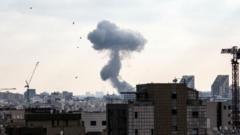The recent military strikes by the US against Iran's nuclear infrastructure represent a significant shift in US-Iran relations, risking further escalation in an already volatile region. Iran's leadership must navigate a precarious situation as they balance the need to maintain national pride against the potential for significant military retaliation.
Rising Tensions: The Implications of US Military Strikes on Iran

Rising Tensions: The Implications of US Military Strikes on Iran
As the US engages in military action against Iran's nuclear sites, the world watches for Tehran's consequential response amidst fears of a broader conflict.
The current crisis between the United States and Iran marks a watershed moment in Middle Eastern geopolitics, with immediate repercussions for both nations and the broader international community. For decades, both countries have maneuvered strategically to avoid direct military engagement, wary of destabilizing the region further. However, President Trump has broken this longstanding restraint by launching military strikes targeting Iran's nuclear facilities, a decision that sends shockwaves throughout the world.
Iran's Supreme Leader, Ayatollah Ali Khamenei, faces a formidable challenge. Reports indicate he is sheltering underground, contemplating Iran's next steps in response to the US strikes. Experts caution that whatever course Khamenei chooses will shape not only his political survival but also Iran's standing in history. "His poisoned chalice is possibly more potent than the one Khomeini drank in 1988," indicates Sanam Vakil of Chatham House, referring to past critical decisions by Iranian leaders.
The Israeli military has already dealt heavy blows to Iran's military capabilities, and the US entry into this theater has amplified pressure on Iran to respond. The Islamic Revolutionary Guard Corps (IRGC), Iran's elite military force, has thrice threatened retaliation against US forces. Observers note, however, that while Iran's leadership seeks to maintain its image as a regional power, the country is hesitant to engage in an all-out conflict.
Critically, any Iranian response must be calibrated to avoid inciting a massive US military counter-response. The potential for miscalculation looms large; whether it's an attack on US troops in the region or a blockade of the strategically vital Strait of Hormuz, consequences could lead to a significant escalation.
Furthermore, Khamenei’s government navigates internal pressures to maintain national dignity and thwart Western narratives of Iranian weakness. Yet, posturing in the face of US aggression necessitates careful consideration, especially given previous responses to US provocations, which have often toned down to avoid exacerbating tensions.
Diplomatic channels lie open, but Iran perceives the US's demands, particularly concerning its nuclear enrichment activities, as wholly unrealistic and undermining its sovereignty. Indeed, incoming messages from Geneva reflect a broader narrative suggesting that the US has betrayed diplomatic efforts. Foreign Minister Abbas Araghchi emphasized this viewpoint, framing the US's military action as a rejection of negotiations, while other international leaders call for de-escalation.
As military and proxy warfare dynamics evolve in the region, particularly with Israeli operations designed to undermine Iran effectively, there is a looming paradox: while the US aims to eliminate the nuclear threat from Iran, its military engagement raises the possibility of Iran advancing its nuclear ambitions more resolutely.
As this geopolitical chess game unfolds, both Washington and Tehran must navigate a web of risks in pursuit of their respective interests, understanding that each subsequent action could summon unforeseen consequences that would resonate far beyond their borders.






















